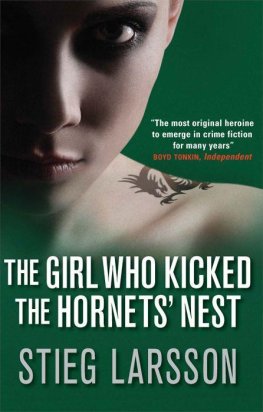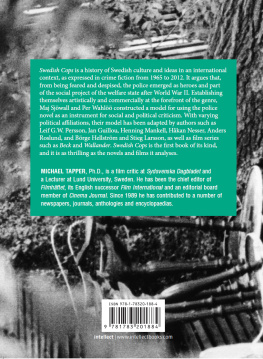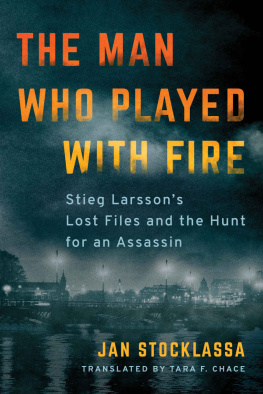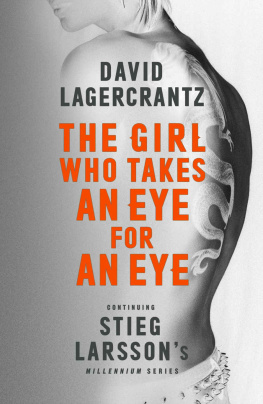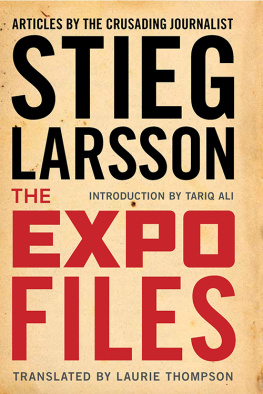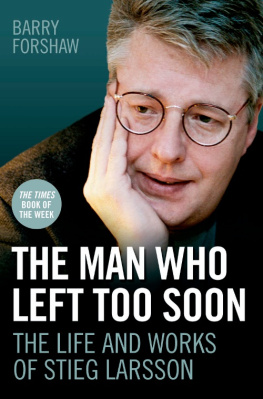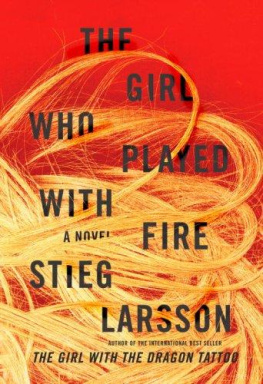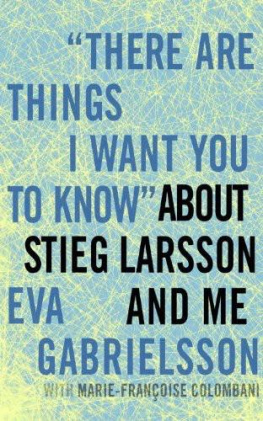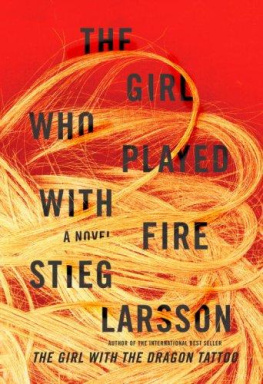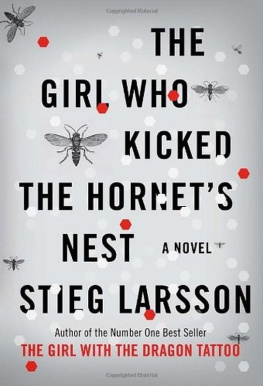STIEG
STIEG
From Activist to Author
JAN-ERIK PETTERSSON
Translated from the Swedish by Tom Geddes

First published in Sweden in 2010 by Telegram Bokfrlag
First published in Great Britain in 2011 by
Quercus
21 Bloomsbury Square
London
WC1A 2NS
Copyright 2010 Jan-Erik Pettersson & Telegram Bokfrlag
English Translation 2011 Tom Geddes
The moral right of Jan-Erik Pettersson to be
identified as the author of this work has been
asserted in accordance with the Copyright,
Designs and Patents Act, 1988.
All rights reserved. No part of this publication
may be reproduced or transmitted in any form
or by any means, electronic or mechanical,
including photocopy, recording, or any
information storage and retrieval system,
without permission in writing from the publisher.
A CIP catalogue record for this book is available
from the British Library
HB ISBN 978 1 84916 499 3
TPB ISBN 978 1 84916 500 6
Text designed and typeset by Ellipsis Books Limited, Glasgow
Printed and bound in Great Britain by Clays Ltd, St Ives plc
FOREWORD
Stieg was not always right. In the five years we worked together on Expo magazine we argued frequently yet amicably. He had his ideas on how Expo should develop and what articles we should publish, I had mine. Sometimes I won, sometimes he did. They were always productive discussions.
On one matter he was certainly proved right: his books were a success. I remember an evening at Stieg and Evas when the other guests had either left or dropped out of the conversation. The whisky was on the table, and for some reason we started talking about pensions. Stieg was not exactly known as a financial genius. Now that he had left his press agency job, I wondered how he would manage financially and whether he had made any provision for the future. He declared confidently that he was going to write a few crime novels that would make him a multimillionaire. I hardly gave his intentions a second thought after that night, but when he showed me his publishers contract I realized he could well be right.
Today the Millennium Trilogy is known more or less all over the world. The argumentative and anecdotic northern Swede has suddenly become a superstar. It is unreal, gratifying and at the same time a little sad.
Stieg was so much more than his crime novels. All of us who lived and worked with him know that he was motivated by neither money nor fame. With this publishing success behind him he would have been in an admirable position as an independent and outspoken social commentator. But it was not to be. All I can do is remind the millions of readers who have been hooked by his plots and his characters that there was another side to Stieg.
It is no coincidence that his crime novels embody trenchant social criticism. Stieg was a political animal. He was a fervent advocate of womens rights. He was an anti-fascist. Despite the runaway success of his thrillers, I have always considered his articles about Swedish and international right-wing extremism more interesting and more important.
But all are linked. Stiegs novels would never have covered the ground they do without his social commitment. For those who want to understand the gestation of the misadventures of Lisbeth Salander and Mikael Blomkvist, the answers are in Stiegs published articles, investigations and surveys; they are in the setting up of the Expo Foundation; they are in his lectures, stories and biography.
They are in this book.
Mikael Ekman
Mellerud, April 2010
AUTHORS PREFACE
This is not a biography in the conventional sense. It is a book about the public persona of Stieg Larsson, about his work and his writing, about the interplay between his life and work and society at large.
The Millennium Trilogy has become a unique phenomenon. No previous Swedish novels have made such an explosive breakthrough on to the international scene or attained such near-mythic status. This phenomenon has not arisen out of nowhere, of course: it has emerged from the broad swell of Swedish crime fiction, which in turn is closely linked to Swedish society, its values and the social and political changes that have so strenuously tested its ideals. Developments in the book trade in recent years, both in Sweden and internationally, have also played their part.
But irrespective of all this, and of whether Stieg Larssons novels will still be read in ten or twenty years time, Mikael Blomkvist and above all Lisbeth Salander will certainly be found in future international handbooks of famous fictional characters.
And the battle against the forces that refuse to regard all human beings as fundamentally equal will continue, whatever the future might bring.
I would like to take this opportunity to thank those who agreed to be interviewed for the book. A special note of gratitude to my editor, Agnete Danneberg, for all her help; and my warmest thanks also to Annika Seward Jensen, publisher at Telegram Frlag, and to Expo.
ACTIVIST
Bjursele was like a poster for the Vsterbotten country village. It consisted of about twenty houses set relatively close together in a semicircle at one end of a lake. In the centre of the village was a crossroads with an arrow pointing towards Hemmingen, 11km, and another pointing towards Bastutrsk, 17km. Near the crossroads was a small bridge with a creek that Blomkvist assumed was the water, the sel. Now at the height of summer, it was as pretty as a postcard.
Stieg Larssons novels are set mainly on the streets and squares of Stockholm, in the editorial offices and cafs of the metropolis. Mikael Blomkvist the journalist is at home there, it is his base, and he makes trips further afield when the task in hand requires. It was on one such job that he ended up in this picture-postcard idyll. In the first book of the Millennium Trilogy, The Girl with the Dragon Tattoo (published in its original Swedish as Men Who Hate Women), he travels up to the landscapes of northern Sweden that the author himself knew well from his childhood. A world away from the urban heart of Stockholm: a village, a lake, a cottage, deep in the rural hinterland of Vsterbotten.
EXCURSION TO BJURSELE
I am on my way from Ume up towards Norsj and Bjursele, driven by Erland Larsson, Stiegs father. It is difficult to believe that this quiet road cutting through the coastal landscape can be the European E4 highway.
Vsterbotten comprises coast, fields and meadows, deep forests, bogs and fells, and covers a seventh of the total area of Sweden. Rivers and streams in parallel sequence cross the country in a south-easterly direction on their way from the mountains to the sea. There are hundreds of lakes, but they are all small, most of them with names ending in trsk (marshy lake).
What we today call Vsterbotten was first settled in the fifteenth century along the coast, where the soil is fertile and the summers often surprisingly warm. Then people moved further up the river valleys, and the poorest or the most adventurous continued northwards into the interior and colonized the great silent wastes.
As we leave Ume Erland points out where he and Stiegs mother, Vivianne, used to join other participants to prepare for the May Day demonstrations. As he was a graphic artist and decorator, he was the one who had to paint all the placards, since it was the simplest and quickest way of getting it done. He and his wife used to march in the Social Democrat procession.
Next page

